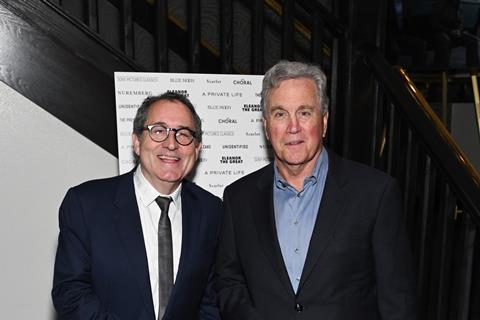
On the 50th anniversary of Toronto International Film Festival (TIFF), Sony Pictures Classics co-presidents Michael Barker and Tom Bernard reflect on many event-filled years attending the event they call “a festival for the people of Toronto”.
This year the industry veterans present eight films, ranging from Rebecca Zlotowski’s A Private Life and Richard Linklater’s Blue Moon, to Hasan Hadi’s Iraqi Oscar submission The President’s Cake, and James Vanderbilt’s Nuremberg, which gets its world premiere as a Gala Presentation this evening (September 7).
When did you first attend TIFF and when did you first do so under your Sony Pictures Classics banner?
Tom Bernard: I first attended TIFF in 1981 when I was head of UA Classics. Wayne Clarkson was the festival head at that time. I’ve attended every year since we started Sony Pictures Classics in 1991.
What are some of your favourite memories from the festival down the years?
TB: There are many! I particularly enjoyed when [Robert] Ebert and [Gene] Siskel interviewed Warren Beatty and Jack Nicholson [in 1985]. Warren insisted on sitting in the crowd rather than on stage – I was asked to sit behind him to ensure he wasn’t bothered. Meeting Michael Hollett from NOW Magazine led to 20-plus years of playing [ice] hockey with him and musician friends during the festival.
Watching Orlando for the first time as the only buyer in the theatre was incredible. I also played tennis with Wayne [Clarkson] for the first four years; whoever won paid for their company’s talent. Spending an hour with Rosalynn Carter while Jimmy Carter was being interviewed was amazing. She was incredibly generous with her time.
Michael Barker: When I first started attending, I was told to get in the lines for popular films. That’s where you do the best networking and understand audience response to films.
What have been some of your key acquisitions at TIFF?
MB: At Sony Pictures Classics, our first major acquisition was Orlando in 1991. Others include Still Alice, which earned Julianne Moore an Oscar, Denis Villeneuve’s Oscar-nominated Incendies, Last Orders, which we acquired in 2001, Maudie with Ethan Hawke and Sally Hawkins, The Penguin Lessons and On Swift Horses [after the 2024 festival], and Wicked Little Letters the year before.
We’ve also launched many of our biggest films there like Call Me by Your Name, The Lives Of Others, Persepolis, Crouching Tiger, Hidden Dragon, multiple Pedro Almodóvar films, starting with Women On The Verge Of A Nervous Breakdown, which won the audience award, Robert Altman’s The Company, Guillermo del Toro’s The Devil’s Backbone, The Triplets Of Belleville, and Chloé Zhao’s The Rider.
What makes TIFF so special?
TB: It’s a festival for the people of Toronto. They programmed the best films from around the world in theatres throughout the city, and the Toronto audience came en masse. They’re huge film fans who catch every nuance the filmmaker intended – movies always play to perfection there. The people of Toronto make the festival. They’re so welcoming and the conversations are fantastic.
MB: The screenings are special. The audience is vocal and responsive and that creates excitement. The presentation quality is terrific, the way films should be seen. Sitting next to someone like Walter Salles at the Scotiabank Theatre [for best international feature film Oscar winner I’m Still Here], which has the best sound and picture, and experiencing that instant electric response – that’s what a perfect screening is all about.
How do you value TIFF as an awards season launchpad?
TB: It depends on the year and when the awards are held. When the Oscars were in late March/early April, TIFF was too far away to be an effective launch. Now that they’re in early March, TIFF has become a viable launchpad alongside Telluride and Venice.
MB: It’s always important to have a profile at TIFF as a bellwether for awards pictures, though the experience is all over the place. You can have the ultimate high, like with Still Alice’s world premiere where we immediately knew Julianne Moore had a shot at the Oscar based on the audience reaction. This informs how to release the film and pursue awards.
How would you like to see the festival continue to evolve?
TB: I’d love to see it recapture what made it truly special: when theatres were spread across the entire city rather than concentrated on one street. It felt like the whole city transformed into a festival and more people participated. There was real excitement when audiences and journalists would hear about a film from Venice or Telluride and flock to see it at TIFF, knowing the festival would showcase it too.
That anticipation and cross-pollination between festivals created incredible energy. TIFF has always had this unique ability to be where all the year’s discoveries converge, giving Toronto audiences access to the most talked-about films from around the world. That citywide energy and the festival’s role as a meeting point for the best of international film is what makes TIFF irreplaceable.
Where are your favorite TIFF hangouts?
MB: Unfortunately our favorite place, Bistro 990, closed down before the pandemic. It was across from the Sutton Place Hotel, and when the festival had theatres both uptown and downtown, it was the go-to place every night – all the filmmakers, actors and journalists would gather there. We had lunch or dinner there every day of the festival. Now I stay at the Hyatt, where there’s a bartender named Maria who is my favorite bartender in town. I’ve seen her serve that place with 120 people and with just five – she’s remarkable and has become my good luck charm. I make sure to see her every year. The restaurant on the second floor of the TIFF Lightbox [Luma] is also nice for a 5pm meal between screenings.















![[L-R]: Amanda Villavieja, Laia Casanovas, Yasmina Praderas](https://d1nslcd7m2225b.cloudfront.net/Pictures/274x183/6/4/1/1471641_pxl_20251224_103354743_618426_crop.jpg)








![[L-R]: Amanda Villavieja, Laia Casanovas, Yasmina Praderas](https://d1nslcd7m2225b.cloudfront.net/Pictures/100x67/6/4/1/1471641_pxl_20251224_103354743_618426_crop.jpg)
No comments yet